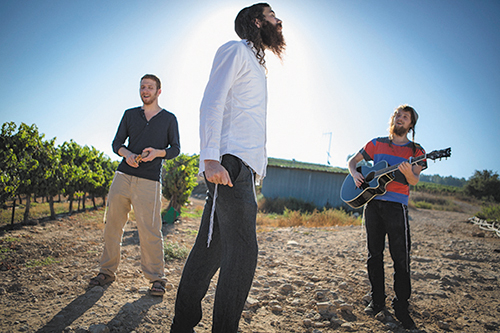
Teaneck is not exactly a hipster mecca, but a couple of its native sons make up two-thirds of Zusha, a band formed in the East Village that stands at the forefront of the flourishing Hasid-hipster scene. Call it Neo-Hasidic, Jewish hipster, or Jewish soul music, the three-man band describes its sound as “a unique blend of jazz, reggae, folk, ska, gypsy, swing, and traditional Jewish soul.” They released their eponymous debut album on October 28 following their EP release show in lower Manhattan on October 26 at the Mercury Lounge.
Zusha is Shlomo Gaisin (vocals), Elisha Mendl Mlotek (percussion) of Teaneck, and Zachariah Goldschmiedt (guitar), also from Teaneck, three self-described Neo-Hasidic friends who were brought together one Shabbos by a mutual friend who became their manager. Borrowing from liturgy, Zusha’s music combines the singing of melodic, wordless niggunim with distinctive percussion and folk-rock song structures. The result is a contemporary sound that is sometimes edgy, often emotional and deeply moving, and frequently infectious and danceable. They consider themselves to be “musical explorers,” and act like modern-day minstrels, performing shows at various East Village apartments for their ardent fan base, occasionally blending their music with informal Neo-Hasidic art exhibits.
“The village is a young, grassroots college scene full of kids who have a constant yearning for Torah,” said Gaisin. “This is a center of the artistic world, rather like Jerusalem, and these Jewish kids have no Jewish community to lean on. This yearning expresses itself in music; it drives their rhythm.” Zusha uses their talent and creativity to connect with Jewish youth who may not relate to a shiur or a shul service. Mlotek added: “The downtown young religious scene is very interesting and parallels our musical influences: it’s vibrant and colorful and mirrors a deep and passionate longing to identify with Judaism and art and all things Torah. Our music was born in that community.” He continued: “This is a new movement, driven by a holy yearning and creativity.”
Goldschmiedt describes the reaction among the non-Jewish audience as “Great! Our music is mostly without words, so anyone can sing it. Our impetus is tikkun olam. We travel around and are in the habit of always singing–everywhere. We perform in subway stations, and all types of people are drawn to it and enjoy it. We want to get the world into the habit of singing. It’s a very spiritual experience for all our beautiful friends, both Jewish and non-Jewish.”
The religiously diverse audiences at their apartment gigs, often numbering 120–150 and aged 18–22, are encouraged to join in on the singing. Whether or not they knew the song, the audience quickly learns it, thus turning their shows into truly experiential events. Their website states: “Zusha songs nurture this concept of the ‘nee-goon’ (or niggun), believing that when songs are unbound by words they can be infinitely personalized and mean different things.”
Each musician brings a different artistic sensibility and different musical influences. Mlotek is heavily inspired by Klezmer and jazz and counts the Grammy award-winning group the Klezmatics as a major influence; he studied with their drummer. Goldschmiedt’s inspiration comes from reggae, swing, and electronic music, and he cites Bob Marley as a muse. Gaisin describes being influenced by classical music and by the sounds of the saxophone, which he also plays. All three refer to Shlomo Carlebach as a major influence, describing him as “an incredible springboard in the re-advent of niggunim.”
The album is full of intricate multi-layered harmonies and was recorded at Mason Jar Music in Brooklyn. Like Matisyahu and Bulletproof Stockings, the band combines traditional Jewish and Hasidic sensibility with modern musical arrangements, and appears to have struck a chord with Jewish and general audiences alike. The band recently returned from a tour in Israel, which brought them to the Safed Klezmer Festival, before returning to New York to release their album “Zusha” and to tour the Northeast through the winter.
For more information, check out www.zusha.com.
By Lisa Matkowsky









